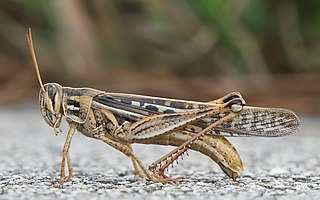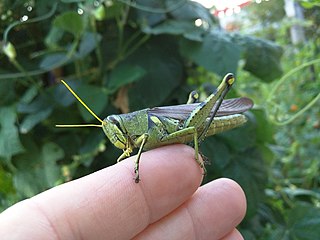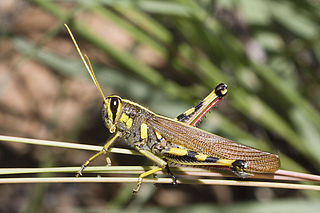
The obscure honeyeater is a species of bird in the family Meliphagidae. It is found in New Guinea.

Schistocerca nitens is a species of grasshopper known by several names, including vagrant grasshopper and gray bird grasshopper. It is a close relative of the desert locust, which is in the same genus. This grasshopper is native to southern North America including Mexico and the south-western United States from California to Texas. Vagrants are occasionally found in Colorado and Nebraska, where the climate is too cold for them to reproduce, otherwise. It is also present in parts of Central and South America. It lives in many habitats including desert, woodland, and lower elevation mountainous areas. It is a large grasshopper, reaching lengths of 4 to 7 centimeters. It is mostly brown and gray spotted or patched in cryptic coloration. This species is known as a pest on ornamental plants and many types of crop plants.

Schistocerca is a genus of grasshoppers, commonly called bird grasshoppers, many of which swarm as locusts. The best known species is probably the desert locust and trans-Atlantic flight may explain the biogeography of some locust species.

Metarhizium acridum is the new name given to a group of fungal isolates that are known to be virulent and specific to the Acrididea (grasshoppers). Previously, this species has had variety status in Metarhizium anisopliae ; before that, reference had been made to M. flavoviride or Metarhizium sp. describing an "apparently homologous and distinctive group" of isolates that were most virulent against Schistocerca gregaria in early screening bioassays.
Schistocerca camerata is a grasshopper species in the genus Schistocerca.

Schistocerca americana is a species of grasshopper in the family Acrididae known commonly as the American grasshopper and American bird grasshopper. It is native to North America, where it occurs in the eastern United States, Mexico, and the Bahamas. Occasional, localized outbreaks of this grasshopper occur, and it is often referred to as a locust, though it lacks the true swarming form of its congener, the desert locust.

Schistocerca alutacea, the leather-colored bird grasshopper, is a species of grasshopper in the family Acrididae. The species occurs in the United States, from Massachusetts to Arizona and Florida.

The Cyrtacanthacridinae are a subfamily of Orthoptera: Caelifera in the family Acrididae. They are sometimes referred-to as bird locusts, criquets voyageurs in French-speaking Africa, and Knarrschrecken in German.
Schistocerca ceratiola, the rosemary grasshopper, is a species of bird grasshopper in the family Acrididae. It is found in North America.

Schistocerca albolineata, the white-lined bird grasshopper, is a species of bird grasshopper in the family Acrididae. It is found in North America, often near the U.S.-Mexico border.

Opeia is a genus of slant-faced grasshoppers in the family Acrididae. There are at least two described species in Opeia.

Schistocerca rubiginosa, the rusty bird grasshopper, is a species of bird grasshopper in the family Acrididae. It is found in North America and South America.

Schistocerca shoshone, known generally as the green bird grasshopper or green valley grasshopper, is a species of bird grasshopper in the family Acrididae. It is found in North America.

Opeia obscura, the obscure grasshopper, is a species of slant-faced grasshopper in the family Acrididae. It is found in Central America and North America.

Schistocerca lineata, known generally as the spotted bird grasshopper or birdwing grasshopper, is a species of bird grasshopper in the family Acrididae. It is found in North America.

Schistocerca damnifica, known generally as the mischievous bird grasshopper or Carolina locust, is a species of bird grasshopper in the family Acrididae. It is found in North America.

Schistocerca pallens is a large “bird grasshopper” in the subfamily Cyrtacanthacridinae that occurs throughout tropical America. It is closely related to Schistocerca cancellata but shows no swarming behaviour or locust phase polymorphism, even under crowded laboratory conditions. Although not a swarming locust, it can occur at sufficiently high densities to cause economic damage. It is mainly a pest of sugar cane, but has also been recorded as damaging almond, banana, beans, breadfruit, carnauba wax palm, chickpeas, coconut palms, cotton, forage crops, groundnuts, indigo, legumes, maize, onions, rice, sorghum, sweet potato and tomatoes.

Schistocerca cohni is a species of bird grasshopper in the family Acrididae. It is found in Mexico.

Schistocerca flavofasciata is a species of bird grasshopper in the family Acrididae. It is found in South America.



















